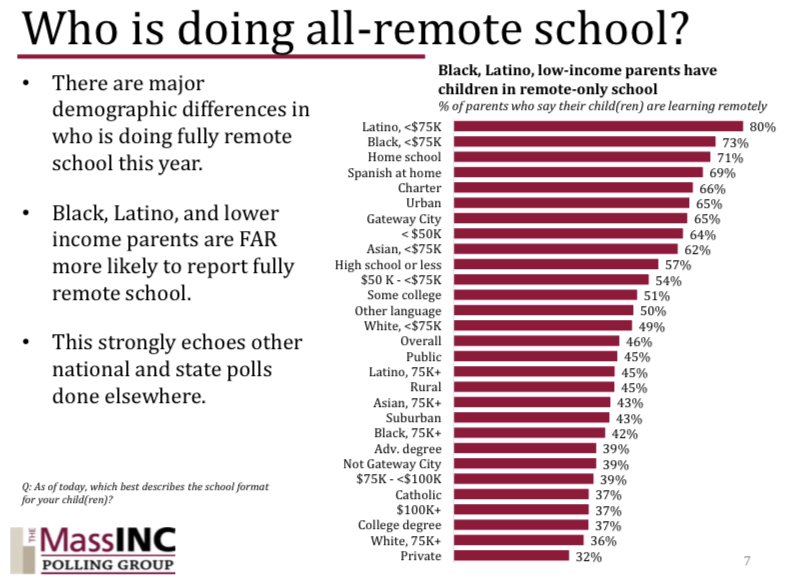A study by MassINC Polling finds major racial and socioeconomic disparities among those who are remote learning in Massachusetts during the coronavirus pandemic.
One of the big divides this school year is school format, with different schools offering various combinations of in-person instruction, online instruction, or hybrid models.
Research reveals there are major differences by race and income groupings in terms of which students are doing what format, raising concerns about long-term impacts on education equity in the state. Black, Latino, and lower-income parents are far more likely to be doing all remote schooling.
Most parents say their children are in either fully remote school (46%) or a hybrid model (46%). Just 11% say their children are doing in-person schooling full time.
White parents and upper-income parents are most likely to say their children are in a hybrid school situation. National surveys and surveys from other states show the same distribution on in-person, hybrid, and remote schooling.
The poll released last month finds that 80 percent of Latino parents making less than $75,000 a year said their kid was fully remote for school. Similarly, 73 percent of Black parents making less than $75,000 said they had a child fully remote.
“These poll results offer an important glimpse into families’ school experience this year. But they also highlight the need for clear, transparent data on student learning experiences and outcomes so that state and local education leaders can figure out how to best support students and families now – and how to mitigate the impacts of the pandemic when schools buildings reopen,” said Natasha Ushomirsky, State Director for Massachusetts at the Education Trust.
“The digital divide was a barrier to learning for our students of color and our economically disadvantaged students long before COVID,” said Lorena Lopera, Executive Director of Latinos for Education. “Today, it’s become a near insurmountable roadblock. Tackling that divide is both an educational and a moral imperative.”
Schools across Massachusetts have reported 527 cases of COVID-19 in students and staff members from Nov. 26 to Dec. 2, according to state education officials. The Department of Elementary and Secondary Education reports cases were among 276 students and 251 staffers.
There were 22 positive students in Methuen, according to the report. New Bedford had 15 positive students and Groton-Dunstable had eight. A total of 103 districts reported at least one student case.
“Families – especially our Black and Brown families – know exactly what’s at stake this year,” said Tiffany Rufino, Regional Director of Parent Villages. “They are going above and beyond every day to ensure students keep learning. Education leaders must work closely with students and families to understand what they need right now and to provide those resources and supports.”





